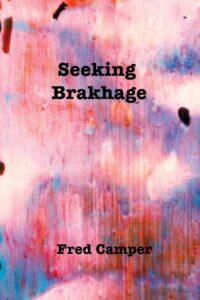Fred Camper’s Seeking Brakhage
Early in the volume of Fred Camper’s collected writings on the films of Stan Brakhage, an essay appears titled “Senses Working Overtime.” Published shortly after Brakhage’s death, Camper’s essay presents testimonials and anecdotes from students and filmmakers who knew him. As the flaws of Brakhage the human are shared alongside moments of awe, present-day readers must remind themselves that, at the time, this was eulogy, heartache, and that eulogy is sacred and intimate. Couched a quarter of the way into a book compiled twenty years after the man’s passing, though, and the context alters: what was once a means of honoring a mentor, a friend, and a great artist, may now be read as beatification, preservation, and transition into canon.
But what if you haven’t been convinced of Brakhage’s place in the tight pantheon of Great Filmmakers? What if you long preferred Stanley Kubrick or Ingmar Bergman? What if his movies just ain’t your cup o’ tea? Worse, what if your significant other has yet to discover in Brakhage what has moved you in secret for years? Will Camper’s book convince her? More importantly, will he convince you? Pagans typically scorn hagiography. A saint in someone else’s religion better have some extra-theological qualifications to lure the heathens through the door. Perhaps this is why the reader needed not just Dante but a Virgil as well: both lead us into an appreciation that transcends the object of affection. Seeking Brakhage is, in this sense, a pilgrimage, and Camper’s essays are his progress, and we are his invited guests.
Prepare your hearts and minds for something more than aesthetics. Ideology and economics make only cursory appearances during biographical interludes (e.g. “Senses Working Overtime” ) and in the apologist’s anti-stance of the last two essays of part 1. Beyond these, Camper writes an aesthetics of the eye with the earnestness of Oscar Wilde’s Jokanaan in the midst of his own 3-minute de profundis, though maybe not in such a way as to grab Salome’s attention and lose his head. It’s an aesthetics that Socrates would have lumped with the poets outside the city gates, as suspicious of its phenomenology sans naming, as it is of cured lepers and backslid Pythagoreans.
Watching a Stan Brakhage film is an exercise in restraining one’s words, whether alone in your living room via the Criterion Collection (whose two volumes Camper wrote liner notes for), or in a university screening room with a willing professor. Reading Camper’s essays, you begin to discern that maybe what’s wrong with your world is that Brakhage isn’t more widely viewed, that maybe what’s wrong with his world is that we’ve lost something along the way and Brakhage found it, but only a few noticed. As cinema, his films expose us to our sense of sight in a way that requires our other senses to scurry off to the volumetric space outside the planar film screen: our rabbit hearing on the noises of other viewers around us, our activated skin on the persons to our immediate right and left, our sense of smell on the entrances and exits of the olfactory players on the darkened stage around us, for this is also cinema—but the iron filings of our sense of sight can only be drawn to Brakhage’s magnetic screen, and our minds attendant on each shot’s passage. A strange, pandemicked sense of time pervades the cinematic experience of a Brakhage film, a reverse hypnotism that narrative cinema rightfully scorns for being anti-narrative: our eyes metamorphose into the alertness of the spider as it sits upon its web, every edit, every shot, all visual data, the duration of shots in relation to the subject or in relation to one another, the frequency of cuts, the mechanical elements of the camera, its movements, the presence of lens and lens flares, and the substrates of the film all come forth in time and rectilinear space, arrange light and color and darkness into a random zodiac that births meaning into our individual and shared experiences of infancy, childhood, adolescence, and on into old age. No wonder Camper’s Seeking Brakhage is a rich 400-plus pages, a monument birthed out of a life for a life. This is aesthetics set directly onto our senses where it belongs, this is the religious and scientific fervor of the Pre-Socratics, the feather that tickled Aristotle’s foot, the dirty joke that made Francis Bacon blush. And yet, at the heart of the book, Chapter 17, Aristotle gets his categoriae, and Francis Bacon his organon. This is rare in a book of cinema.
Aesthetics, of course, gets dismissed for all the right reasons: it’s exclusionary, it’s restrictive, it’s enamored of its own meaning, valued for itself by itself, rather than for its utility to the party, the friends of the party, or for its vituperations against the enemies of the party, may their mothers rot in hell. And this is where Fred Camper shines. He brings us back to the individual who encounters the art, because Seeking Brakhage is about encountering the art as an individual. The book allows us our own interpretations of what we see: for instance, I saw the cuts in the first two minutes of Brakhage’s Anticipation of the Night (1958) as demonstrations of sleight of hand, temporal evidence of a filmmaker who, after capturing images of light and shadow, of diffusion and sharpness, then entered enamored into a different artistic process involving razors and tape, tools far from the mysteries of lens and emulsion; Camper’s essay on the same film goes much wider in a single paragraph than my first impression, acknowledging and moving past—but never denying—my own observations. His writing creates a natural space for the individual viewer to seek Brakhage with him. In this way, Camper’s writing separates itself from much writing on abstract art by being both concrete and generous at the same time. In essay after essay Camper posits that Brakhage’s films are already a part of our common experience, we just don’t know it yet. He takes us by the eyelashes and like a mischievous Tex Avery hero pries open our eyelids and asks us in polite tones to please see again as once we saw: Red Hot Riding Hood wears no hood.
What is missing from Seeking Brakhage is writing that gives in to the laconic methodology of literary film criticism. Both Brakhage and Camper are prophets of the subvocalized Eye, the former raised up as savior, the other still crying in the wilderness at fredcamper.com and in this book. Maybe we’ve been fooled into believing that words are the Thing, instead of the Thing-itself deserving ourattention. This makes Brakhage difficult, imposing even, but Brakhage is difficult because we 21st century smartfolk find our meaning in words rather than images, in self-performing posts rather than through events.
The title of Camper’s book offers its own key to one’s intellectual acquisition of Brakhage films, not as instances of remote events in one’s past, but as a never-ending journey through an ever-present Now. Had the title been Brakhage Sought, the book would offer the reader a very different sort of experience: exegesis, didactic, polemic, screed, manifesto, eulogy, final word. Instead we are invited to join the author past the final note on the final page, to continue seeking with him. In that sense, Camper’s book is generous, not only offering us keyholes through which we might glimpse Brakhage’s work, but also vistas off Mount Purgatorio, where we are encouraged to pause and turn away from death’s horrors towards sublime, living vistas beyond. At one point (p. 337) Camper describes Brakhage’s filmic vision as “…the raw meat of seeing…”, a brilliant formulation that explains why many of the essays must introduce Brakhage anew—no matter how much we know about Brakhage and his methods and aims, we are constantly presented with a fresh kill, one that holds within it the potential to nourish or surprise our word-addled minds.


